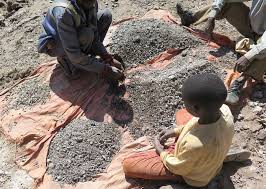Six-year-old Juliet Samaniya, wearing a worn pink dress, squats under blazing sun to use a stone tool to chip away at a sharp white rock.
She toils for less than a dollar a day, her hair and little hands covered with dust.
Around her are both active and closed mineshafts, farmland that will soon be removed to make way for more valuable ore, and other mine workers, many of whom are young.
Juliet should be at school, her mother, Abigail Samaniya, admits. In order to provide for her family, she instead spends her day mining lithium, a mineral that is essential for batteries used in the world’s shift to renewable energy.
“There is no other choice,” Abigail Samaniya stated.
Over a million children are estimated by the International Labour Organization to be employed in mines and quarries globally; this issue is most severe in Africa, where poverty, a lack of educational opportunities, and lax laws exacerbate the situation.
Children who labor long hours at hazardous locations, crushing or sifting rocks, carrying large amounts of ore, and being exposed to poisonous dust that can cause asthma and other respiratory issues, are primarily employed in small-scale mines.
Nigeria, which is rich in minerals, has opened up new mining opportunities due to the rising need for lithium.
However, the price has been high, as its most vulnerable and impoverished members—its children—have been exploited.
Their labor is frequently used as raw material by Chinese companies that control Nigeria’s loosely regulated extractive sector and are frequently held accountable for labor exploitation and illicit mining.
Several inquiries for response from that company, RSIN Nigeria Limited, were not answered.
However, the Chinese embassy in Abuja said in a release that Chinese mining businesses in Nigeria “operate in line with local laws and regulations. “
Nigeria has laws that forbid child labor and require a minimum level of education, but enforcement is difficult because there are so many illegal mines in remote locations.
Another issue is corruption among law enforcement and regulatory personnel.
According to the government, it is working on reforms that would make the rules more stringent.
To stop illicit mining, it also established a “corps of mining marshals” earlier this year, but environmentalists say it’s too early to tell if the program has any effect.
The operation of illicit mines in Nigeria
Shedrack Bala, a 25-year-old who started working in the mines at the age of 15 and currently runs his own pit, claimed that the start of lithium mining in Pasali ten years ago turned the sleepy, isolated hamlet into a hive of small-scale illicit mining.
The area is now dotted with dozens of mines, unlicensed.
The mining techniques are risky and antiquated. Miners descend several feet into dark pits by breaking through rocks with heavy hammers and chisels.
Before beginning to dig, workers must squeeze through tight spaces that snake between shaky mud walls in some ancient but still functional mines. Dynamite is used to blow the ground open for new mines.
19-year-old Bashir Rabiu began working in these pits as a child laborer. He wriggled around at the bottom of a pit, where workers could be in danger if dynamite burst too soon.
They also run the risk of being buried by collapsed walls or suffocating in the small tunnels that connect pits, both of which Rabiu has witnessed happen to other miners.
“But protection comes from God,” he continued.
Juliet and five other children, all under 10, received raw lithium from Rabiu after he dragged it up.
The children, dressed in dust-stained shorts, shirts, and rubber shoes, crouched over piles of debris and chipped away with rudimentary stone tools to retrieve valuable pieces.
The minerals were packed after sorting in order to start their journey from Pasali to the global supply chain.
A group of six kids can sort and bag up to ten 25-kilogram bags of lithium-rich rock each day. They can complete 22 kilograms (about 48.5 pounds) in an hour.
According to Bala and other users, the kids usually split 4,000 naira (about $2.42) for working from early morning till late evening. According to them, the funds are sufficient to pay for meals at the children’s homes.
Only Juliet and Zakaria Danladi, a 5-year-old kid, had ever gone to the neighborhood primary school. When Zakaria became an orphan, he stopped.
According to her mother, Juliet was pulled out because her family couldn’t afford to send her and her brother, who is eleven years old, and his education came first.
In Nigeria, basic education should be free—at least in government institutions like the one in Pasali.
However, the poorest families are frequently unable to afford it due to hidden expenses.
For instance, parents in Pasali reported that a 5,000 Naira (about $3) Parent-Teacher Association levy is assessed each term. Even this sum is too much for Juliet’s family and others. Approximately 63% of Nigerians are impoverished.
The schoolmaster, Dantini, said that his classes were now almost empty, with only three students showing up.
“Due to mining, attendance has been extremely low, even though I used to have up to 300 students.” He rejected the fees charged by the school.
Miners claim that finding buyers is easy for them.
In addition to producing the most oil in Africa, Nigeria is working to lessen its dependency on petroleum exports by utilizing its rich natural resources, which include granite, limestone, and gold.
Laptops 1000However, a legislative investigation last year found that a large portion of this wealth, particularly lithium, is syphoned off through unregulated mines that cost the country billions of dollars and fuel insecurity.
Informal networks of buyers and sellers who operate with little fear of the law are the lifeblood of clandestine mining.
In addition to purchasing lithium ore from other illicit sources, Aliyu Ibrahim, a lithium dealer in Nasarawa, controls unlicensed mines. In his warehouse, he said he makes a lot of money by paying officials to ignore his problems. Ibrahim claimed that he then sells his lithium in large quantities to Chinese businesses.
Ibrahim acknowledged that youngsters labor in his mines and those he purchases from, but he claimed that a large number of them are impoverished or orphans.
While the government has abandoned the poor, he continued, “It is dangerous, but the work helps them survive.”
Some of the bush miners sell straight to Chinese businesses or Chinese citizens, eschewing intermediaries like Ibrahim.
Without inquiring about the origin of the minerals or the circumstances surrounding their extraction from illegal mines, in Pasali they sold to RSIN Nigeria Limited, which is owned by China.
There, a sales agreement was established. Sellers were asked to leave samples to test for lithium content. The purchasers’ price list stated that a metric ton of minerals with up to 3% lithium would cost 200,000 naira, or roughly $119.
In several nations, Chinese people and businesses are regularly in the news for their illegal mining, labor abuses, and environmental harm.
In recent months, Nigeria has witnessed numerous arrests and trials of Chinese people involved in unlawful mining.
According to experts, the items are exported in a number of ways, including as being concealed within genuine shipments or being shipped with fictitious papers.
The Chinese Embassy, in a release, said they have zero tolerance stance for any illicit labor or mining operations by Chinese businesses doing business overseas.
Nigerian activist Philip Jakpor claimed that his nonprofit organization, Renevlyn Development Initiative, had uncovered extensive child labor in the state of Nasarawa.
“The need to protect human rights appears to have been subordinated to revenue generation,” Jakpor stated.
“We anticipate that those working in the upper echelons of the supply chain will embrace ethical models that stop exploitative practices in the mining industry.”
Human Rights Watch’s associate director of children’s rights, Juliane Kippenberg, stated that governments must defend human rights and pressure businesses to do the same because the world’s need for lithium is predicted to increase significantly in the years to come.
Reducing the use of child labor is the goal of current reforms including changing the Minerals and Mining Act, according to Segun Tomori, a spokesman for the Ministry of Mining and Solid Minerals Development.
Tomori added that social safety measures like school nutrition programs are being redesigned to prevent child labor and keep children in school.
He also mentioned this year’s announcement of a scheme to increase the number of mining marshals to combat illicit mining.
Juliet’s mother, 6-year-old Abigail Samaniya, expressed her hope that her daughter will one day leave the mine.
She said, “I still want her to go to school, have a better life, and work in an office instead of mine forever.”




















